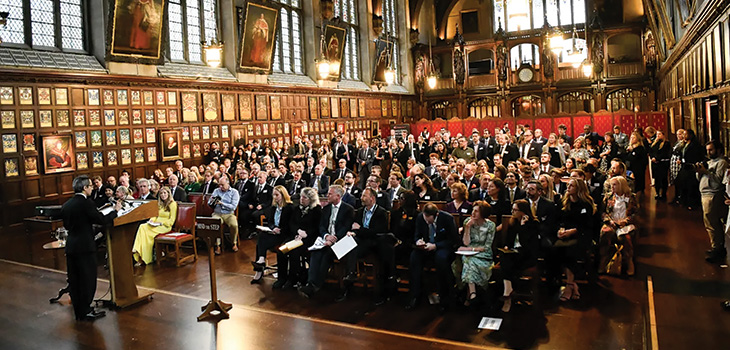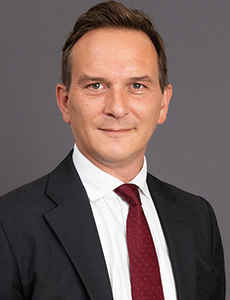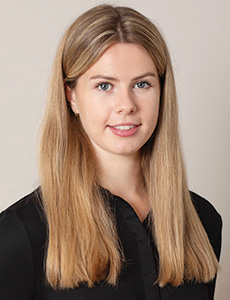*/


The mainstay of my work involves advising and representing parties in employment matters. I have found this work varied and rewarding over the past 15 years, consistently throwing up new issues and problems to resolve. Practice at the Bar is a great privilege and can be enormously complex – but at its root, someone has a legal problem, and you help them to solve it.
The same has always been true of my pro bono work. I started taking pro bono cases in my second six and have maintained a commitment to taking on new matters every year. Why? Well, why not? To me, it’s another client, with a new set of legal problems, where I have a particular set of skills to deploy on their behalf to try to improve their situation.
In more recent years, the majority of my pro bono work has been in appeals, challenging decisions where something had gone wrong at first instance where those I represent have typically been representing themselves. You are parachuted into some of the hardest moments in your client’s lives, confronted by the underlying difficulty that they are litigating and compounded by a justice system not well-designed for those representing themselves, where they often struggle to articulate their case and stumble at procedural hurdles.
One recent client wrote to me after winning their appeal that he’d spent five years trying to argue a particular point, not really knowing how to articulate the complex point he was seeking to make. He needed help, and it was a pleasure to speak for him and get his point across. At the coal face, pro bono work raises questions about real access to a justice in a system often too complex for litigants in person to navigate; but it’s also sometimes just about helping someone out.
One particular highlight of the last year was representing Mrs S in the Court of Appeal. She had lost a pregnancy discrimination claim at first instance, tried to lodge an appeal but had failed to do so properly within the time limit. The Appeal Tribunal refused to extend time under the harsh interpretation of the rules operated at the time. Mrs S then lodged an appeal with the Court of Appeal and the case came to me via Advocate a week before the hearing. Thankfully, we persuaded the Court of Appeal that the longstanding approach adopted by the Appeal Tribunal had been wrong in law. Hundreds of litigants, often unrepresented, have benefitted from a more nuanced approach to navigating complex and rigid procedural rules. I then persuaded the Appeal Tribunal that there were real errors in the first instance decision and she should be permitted to challenge the outcome. The case subsequently settled, and Mrs S told me what difference the settlement sum would make to her family. She’d gone from having lost a case and fought against a rigid system to having a decent settlement sum and the opportunity to move on.
I don’t think it’s unfair to say that Mrs S simply couldn’t have done this by herself. She had been completely overwhelmed by the justice system from the outset and struggled to articulate her case in an unfamiliar environment. The Bar exists to provide specialist advocacy skills because these are of great value to clients: it is one of the joys of practice to able to afford the same specialist representation to those who need it most and can least afford it.
In addition, it has been so rewarding to build teams around pro bono cases and to take the opportunity to lead some amazing colleagues. Much of my work is either as sole counsel or led by KCs. I brought Anna Greenley in on a case in the Court of Appeal, led Hitesh Dhorajiwala in the Employment Appeal Tribunal and was brought into another case in the Employment Appeal Tribunal by John Platts-Mills.
I strongly encourage anyone at the Bar who is considering pro bono work to get involved. Your expertise can make a meaningful difference in cases that truly deserve it.

Since joining Field Court Chambers in April 2024, I’ve seen first-hand the powerful impact pro bono work can have on individuals, including the barristers themselves, and the wider community. It’s been incredibly rewarding to help encourage more members of our chambers to get involved in pro bono work.
During the last year, I’ve helped build new relationships with pro bono organisations like Action for Children’s London Advocacy Service, which supports children in contact with social services. I also developed the partnership that one of our family law barristers had established with Not Beyond Redemption – which provides free legal advice and representation to mothers in prison seeking contact with their children.
With the London Advocacy Service, six barristers from chambers now provide expert advice across a range of public law and children matters. In one case, an advocate was able to secure the reopening of a complaint with the Local Government and Social Care Ombudsman for a six-year-old boy in care – an outcome that wouldn’t have been possible without the pro bono legal advice of Tony Harrop-Griffiths – one of our experienced community care law barristers.
Our partnership with Not Beyond Redemption has also gone from strength to strength. To mark International Women’s Day, I invited representatives from the charity to come into chambers to speak about the impact of maternal imprisonment on child development. We now have three barristers assisting the charity. In one recent case, Rebecca Davies obtained a further assessment for her client and ensured that an order for indirect contact with her child was continued.
I’m proud to have supported these partnerships which underline our commitment to access to justice, and I hope they will continue to grow.
Outside of chambers, I’ve also volunteered with Advocate, assisting the casework team on family law matters and supporting applicants navigating the often daunting and overwhelming court process alone. It means a great deal to contribute to the incredible work being done.
I was drawn to volunteering because I wanted to do something practical and meaningful to support those who do not have access to any advice or representation. But it’s also been an opportunity to explore areas of law that were new to me. I’d encourage anyone – especially those considering a legal career – to apply to volunteering schemes. You don’t have to be a qualified lawyer to make a real difference.
I’m absolutely honoured to receive the Chambers Professional of the Year Award. While Field Court is a smaller set, we are deeply committed to pro bono work, and many of our barristers regularly volunteer their time while managing demanding practices. I’m proud to share this award with them.
Part 1 of this series appeared in the August issue of Counsel and featured Iona Gallagher (Young Pro Bono Barrister of the Year), Edward Fitzgerald KC (Pro Bono KC of the Year), Adam Wagner KC (International Pro Bono Barrister of the Year) and Da’aro Youth Project (Pro Bono and Social Responsibility Initiative of the Year).
In part 3 of this series in October, we will hear from Ramby de Mello, winner of this year’s Lifetime Achievement in Pro Bono Award, and Doughty Street Chambers, this year’s Pro Bono Chambers of the Year. See the full list of winners here and read about all the shortlisted nominees here.
The Bar Pro Bono Awards are organised by Advocate – the national pro bono charity of the Bar – to celebrate the remarkable pro bono achievements of the Bar in England and Wales. To find out more about Advocate visit www.weareadvocate.org.uk.


The mainstay of my work involves advising and representing parties in employment matters. I have found this work varied and rewarding over the past 15 years, consistently throwing up new issues and problems to resolve. Practice at the Bar is a great privilege and can be enormously complex – but at its root, someone has a legal problem, and you help them to solve it.
The same has always been true of my pro bono work. I started taking pro bono cases in my second six and have maintained a commitment to taking on new matters every year. Why? Well, why not? To me, it’s another client, with a new set of legal problems, where I have a particular set of skills to deploy on their behalf to try to improve their situation.
In more recent years, the majority of my pro bono work has been in appeals, challenging decisions where something had gone wrong at first instance where those I represent have typically been representing themselves. You are parachuted into some of the hardest moments in your client’s lives, confronted by the underlying difficulty that they are litigating and compounded by a justice system not well-designed for those representing themselves, where they often struggle to articulate their case and stumble at procedural hurdles.
One recent client wrote to me after winning their appeal that he’d spent five years trying to argue a particular point, not really knowing how to articulate the complex point he was seeking to make. He needed help, and it was a pleasure to speak for him and get his point across. At the coal face, pro bono work raises questions about real access to a justice in a system often too complex for litigants in person to navigate; but it’s also sometimes just about helping someone out.
One particular highlight of the last year was representing Mrs S in the Court of Appeal. She had lost a pregnancy discrimination claim at first instance, tried to lodge an appeal but had failed to do so properly within the time limit. The Appeal Tribunal refused to extend time under the harsh interpretation of the rules operated at the time. Mrs S then lodged an appeal with the Court of Appeal and the case came to me via Advocate a week before the hearing. Thankfully, we persuaded the Court of Appeal that the longstanding approach adopted by the Appeal Tribunal had been wrong in law. Hundreds of litigants, often unrepresented, have benefitted from a more nuanced approach to navigating complex and rigid procedural rules. I then persuaded the Appeal Tribunal that there were real errors in the first instance decision and she should be permitted to challenge the outcome. The case subsequently settled, and Mrs S told me what difference the settlement sum would make to her family. She’d gone from having lost a case and fought against a rigid system to having a decent settlement sum and the opportunity to move on.
I don’t think it’s unfair to say that Mrs S simply couldn’t have done this by herself. She had been completely overwhelmed by the justice system from the outset and struggled to articulate her case in an unfamiliar environment. The Bar exists to provide specialist advocacy skills because these are of great value to clients: it is one of the joys of practice to able to afford the same specialist representation to those who need it most and can least afford it.
In addition, it has been so rewarding to build teams around pro bono cases and to take the opportunity to lead some amazing colleagues. Much of my work is either as sole counsel or led by KCs. I brought Anna Greenley in on a case in the Court of Appeal, led Hitesh Dhorajiwala in the Employment Appeal Tribunal and was brought into another case in the Employment Appeal Tribunal by John Platts-Mills.
I strongly encourage anyone at the Bar who is considering pro bono work to get involved. Your expertise can make a meaningful difference in cases that truly deserve it.

Since joining Field Court Chambers in April 2024, I’ve seen first-hand the powerful impact pro bono work can have on individuals, including the barristers themselves, and the wider community. It’s been incredibly rewarding to help encourage more members of our chambers to get involved in pro bono work.
During the last year, I’ve helped build new relationships with pro bono organisations like Action for Children’s London Advocacy Service, which supports children in contact with social services. I also developed the partnership that one of our family law barristers had established with Not Beyond Redemption – which provides free legal advice and representation to mothers in prison seeking contact with their children.
With the London Advocacy Service, six barristers from chambers now provide expert advice across a range of public law and children matters. In one case, an advocate was able to secure the reopening of a complaint with the Local Government and Social Care Ombudsman for a six-year-old boy in care – an outcome that wouldn’t have been possible without the pro bono legal advice of Tony Harrop-Griffiths – one of our experienced community care law barristers.
Our partnership with Not Beyond Redemption has also gone from strength to strength. To mark International Women’s Day, I invited representatives from the charity to come into chambers to speak about the impact of maternal imprisonment on child development. We now have three barristers assisting the charity. In one recent case, Rebecca Davies obtained a further assessment for her client and ensured that an order for indirect contact with her child was continued.
I’m proud to have supported these partnerships which underline our commitment to access to justice, and I hope they will continue to grow.
Outside of chambers, I’ve also volunteered with Advocate, assisting the casework team on family law matters and supporting applicants navigating the often daunting and overwhelming court process alone. It means a great deal to contribute to the incredible work being done.
I was drawn to volunteering because I wanted to do something practical and meaningful to support those who do not have access to any advice or representation. But it’s also been an opportunity to explore areas of law that were new to me. I’d encourage anyone – especially those considering a legal career – to apply to volunteering schemes. You don’t have to be a qualified lawyer to make a real difference.
I’m absolutely honoured to receive the Chambers Professional of the Year Award. While Field Court is a smaller set, we are deeply committed to pro bono work, and many of our barristers regularly volunteer their time while managing demanding practices. I’m proud to share this award with them.
Part 1 of this series appeared in the August issue of Counsel and featured Iona Gallagher (Young Pro Bono Barrister of the Year), Edward Fitzgerald KC (Pro Bono KC of the Year), Adam Wagner KC (International Pro Bono Barrister of the Year) and Da’aro Youth Project (Pro Bono and Social Responsibility Initiative of the Year).
In part 3 of this series in October, we will hear from Ramby de Mello, winner of this year’s Lifetime Achievement in Pro Bono Award, and Doughty Street Chambers, this year’s Pro Bono Chambers of the Year. See the full list of winners here and read about all the shortlisted nominees here.
The Bar Pro Bono Awards are organised by Advocate – the national pro bono charity of the Bar – to celebrate the remarkable pro bono achievements of the Bar in England and Wales. To find out more about Advocate visit www.weareadvocate.org.uk.


The Bar Council is ready to support a turn to the efficiencies that will make a difference
By Louise Crush of Westgate Wealth Management
Marie Law, Director of Toxicology at AlphaBiolabs, examines the latest ONS data on drug misuse and its implications for toxicology testing in family law cases
An interview with Rob Wagg, CEO of New Park Court Chambers
What meaningful steps can you take in 2026 to advance your legal career? asks Thomas Cowan of St Pauls Chambers
Marie Law, Director of Toxicology at AlphaBiolabs, explains why drugs may appear in test results, despite the donor denying use of them
Ever wondered what a pupillage is like at the CPS? This Q and A provides an insight into the training, experience and next steps
The appointments of 96 new King’s Counsel (also known as silk) are announced today
Ready for the new way to do tax returns? David Southern KC continues his series explaining the impact on barristers. In part 2, a worked example shows the specific practicalities of adapting to the new system
Resolution of the criminal justice crisis does not lie in reheating old ideas that have been roundly rejected before, say Ed Vickers KC, Faras Baloch and Katie Bacon
With pupillage application season under way, Laura Wright reflects on her route to ‘tech barrister’ and offers advice for those aiming at a career at the Bar